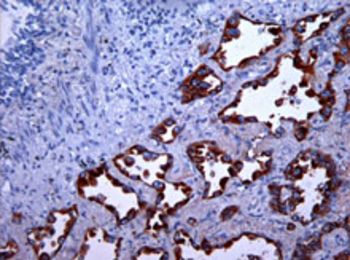MAdL monoclonal antibody: A novel, highly specific and sensitive biomarker for adenocarcinomas of the lung
Challenge
Lung cancer is one of the leading causes of death worldwide. Among the disease, differentiation between small cell lung cancer (SCLC) and non-small cell lung cancer (NSCLC) is of huge therapeutic relevance. Novel chemo-therapeutic approaches have been developed for NSCLC, which is known as a largely chemo-resistant tumor group. Clinical studies revealed substantial differences between the adequate therapeutic regimens for the three main types of NSCLC (adenocarcinomas vs. squamous cell carcinomas vs. large cell carcinomas). Existing markers, i.e.TTF-1, SP-A, SP-B, either lack sensitivity or specificity, and accordingly, novel markers are needed to allow a more reliable sub-differentiation of NSCLC.
Technology
The monoclonal MAdL antibody has been raised against human alveolar epithelial cells type II, and represents a highly specific marker for adenocarcinomas of the lung. In addition, it specifically detects alveolar epithelial cells type II and alveolar macrophages. The antibody can be used for analyses of native, formalin-fixed and HOPE-fixed tissue samples.
Commercial Opportunity
The technology is offered for in-licensing.
Development Status
In a study, comprising 280 specimens, the sensitivity and specificity of the MAdL antibody has been analyzed and compared with established markers (TTF-1, SP-A, SP-B). The MAdL antibody reveals >99% specificity for adenocarcinomas of the lung (TTF-1: 88%), and possesses a much higher sensitivity (74%) compared to the established markers (SP-A: 55%, SP-B: 53%). MAdL has been successfully used as an supplementary marker for adenocarcinomas in routine analysis of clinical specimens. The marker is not expressed in SCLC and carcinoids, and its expression in NSCLC remains constant with increasing tumor malignity.
Further Reading
Schultz et al (2011) Generation and evaluation of a monoclonal antibody designated MadL, as a new specific marker for adenocarcinomas of the lung. British Journal of Cancer 105: 673-681




